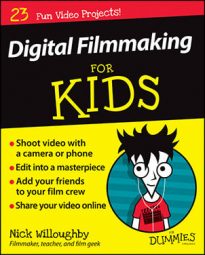Filmmaking auditions can be quite stressful, so they’re also a good way to see how an actor works under pressure. This can give you an idea of how the actor will behave in front of a camera. After all, even the most confident person can go shy when a camera is pointed at them. Auditions can also be good experience for the actor, especially if acting is something he or she wants to do as a career.
The following list describes some things to look for in the actors you meet when running auditions:
How do they deal with stress? It’s not unusual for actors to get nervous. It’s how they deal with that problem on-camera that’s important. Can they hide their nerves? Do the nerves affect their performance? Do they look like a stunned rabbit in headlights? Give them time to relax by telling them about what will happen in the audition and a bit about the production if you want. Here you can see how they listen and if they are interested in what you are telling them.
Are they natural? When an actor is performing, does it look and feel real? You should be able to believe what the actor is saying and almost forget that she is playing a role. Does she sound like she is just reading lines? If so, ask her to think more closely about the lines she is performing and to try to imagine herself as the character.
What’s the actor’s voice like? An actor’s voice should suit the character and the lines they’ll be saying in the film. When performing, does the actor sound like a robot or does he deliver the lines with feeling and emotion? An actor’s voice is as important as his facial expressions and his body. It should convey emotion, and it should sound interesting, not boring. Also, listen to how clear his voice is: Does he mumble or rush words?
How does the actor respond to direction? The actor you choose should listen to you and do what you ask them to do. The last thing you want is an actor who thinks she knows better than you and does whatever she likes. During the audition, ask your actors to change something about the way they deliver their performance. See whether they do what you ask (or whether they at least try). You could ask them to pause before saying a line or change the amount of emotion in a line — for example, as the actor to “be more angry,” or “be less cheerful.”
How does the actor work with other actors? It’s important that your actors be able to work well both on their own and with other actors. The only way to test this in an audition is to have the actor act a scene with another actor in the audition. Look to see whether the actor responds to what other actor is doing in the scene. Does he overpower the other actor or does he support them?
Has the actor learned the lines? If you asked the actor to learn a scene or part of the script for the audition, she should have taken the time to learn it. This shows whether she is committed to your film and is a reflection of how much she wants the part. You could allow them to have the script on hand to refer to, if necessary but sometimes a script can be more of a distraction than a support — if it’s there, she’ll look at it. Ask her if she’s all right with working without a script before taking it away from her.
What does the actor know about the character? Knowing some background about the role shows enthusiasm and a real desire to get the part. As part of your audition process, ask the actor questions about the character and what he knows about the film. Remember, he won’t be a mind reader, so unless you provided information about the project with the audition information, then he won’t be able to answer much. You could ask him about the character, however, because he could get some information from the script. For example, you could ask him what he thinks is happening in the scene he’s prepared, about the emotions the character is expressing, and how he feels about playing the character.

